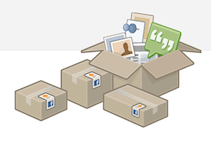 Grab the popcorn. There is a serious nerd fight brewing.
Grab the popcorn. There is a serious nerd fight brewing.
Following Facebook’s big Open Graph announcements at f8 a couple days ago, many of the leaders of the so-called “open web” are taking exception to Facebook’s use of the term “open” for its grandiose plans. While the Open Graph may be a lot of things, it is not open, is the feeling many of them have, as Erick laid out earlier.
Specifically, most of them are targeting the new Like button that is appearing everywhere on the web (including on TechCrunch). It’s an obvious target as it’s the most visible part (at least so far) of the Open Graph protocol. Investor/Hunch co-founder Chris Dixon is leading the effort for a new OpenLike button (though he wants someone else to be in charge). And Google’s Open Web Advocate, Chris Messina, has already ripped apart Facebook’s Like button in a blog post.
Anyone could have predicted these reactions immediately after Facebook’s announcements — in fact, I did (last paragraph). The fact of the matter is that Facebook is one of the most powerful forces on the web and they’re now using that position to introduce a new platform that will yes, help them. Shocking, really. A company that wants to do something that will benefit itself. But I do believe that Facebook, at least in part, believes this will also make the larger web better too. But that’s not going to be good enough for some, because it’s not fully open. Nevermind that plenty of these fully open solutions always being advocated never make it off the ground for one reason or another.
But what may be most interesting to me in all of this is that Facebook actually has one of these open web guys working there. In August of last year, Facebook hired Dave Recordon as a “Senior Open Programs Manager.” Recordon has long been a central figure in the open web discussion. For example, back in 2005 he helped create OpenID. So I asked Recordon what he thought about this latest melee, and specifically, Messina’s post.
In response, Recordon pointed me to this Google Group thread. Here, Recordon has a long response directly to a question Messina asked. I’ll paste both below.
Two days ago, Messina wrote:
In all seriousness — not trying to snark — just trying to understand what’s intended by “open” in the open graph protocol? Thanks! Congrats on the launch.
Chris
Yesterday, Recordon answered:
I think open means a few things in this context:
First of all it is designed to increase openness between people based
on being able to connect with things all around the web. Within
Facebook this means that people can like any web page anywhere, not
just those on facebook.com.Second, the Open Graph protocol increases the amount of semantic data
on the web in a manner that isn’t specific to Facebook or any single
social network. While we can all disagree about where the quotes and
angle-brackets should go, at the end of the day I think we all can
agree that this sort of metadata is good for the web.Third, it was created and implemented by more than one company. We’re
now broadening that group of people (right here) and are interested in
evolving the spec in a meritocratic fashion.Finally, it’s licensed from day one under the Open Web Foundation
Agreement (http://bit.ly/6zaAYh). As Jesse Stay wrote (http://bit.ly/
c0ROCw), this means that it, “is under a completely open license
agreement that other platform creators can adopt, use, and freely
distribute.”That help?
–David
To that, Messina responded:
What other companies were involved in the creation of the OGP?
Where is the signed agreement? While I think it’s awesome that you’re using
the OWF agreement here, it seems like there actually needs to be a signed
agreement stored someone online by ALL the parties that affected by the
terms of the agreement.Thanks. Eager to see the signed agreement!
At this point, Recordon noted that they should probably move the discussion to the Open Web Foundation mailing list. I assume anyone can sign up for that (wouldn’t be very “open,” if not), so look there for more juicy open web in-fighting.

Recordon has some good points there, but the one he doesn’t make (of course), is that Facebook has the right to do things beneficial for Facebook. The best argument you can make against this is that what’s beneficial to Facebook may not be most beneficial to us all. In a thorough breakdown of Open Graph at ReadWriteWeb, Alex Iskold (who is also active in the OpenLike community) makes a good case for this:
Technically speaking, what Facebook has done is elegant and correct. From markup, to plugins, to API, all of it is modern and awesome. The missing bit is that Facebook appears to be the only repository of data in this equation – and that makes the whole offering seriously closed. Publishers and users don’t have a choice as to where to store the data. It is going to Facebook and Facebook alone. Perhaps there is a way to rework the system in a way that fixes that.
Of course, then publishers don’t have to use Facebook’s Like button. But they will — I can think of nearly 500 million reasons why. Love it or hate it, that’s the way it is. It’s not good versus evil. It’s not black versus white. It’s a million shades of gray, as always.
